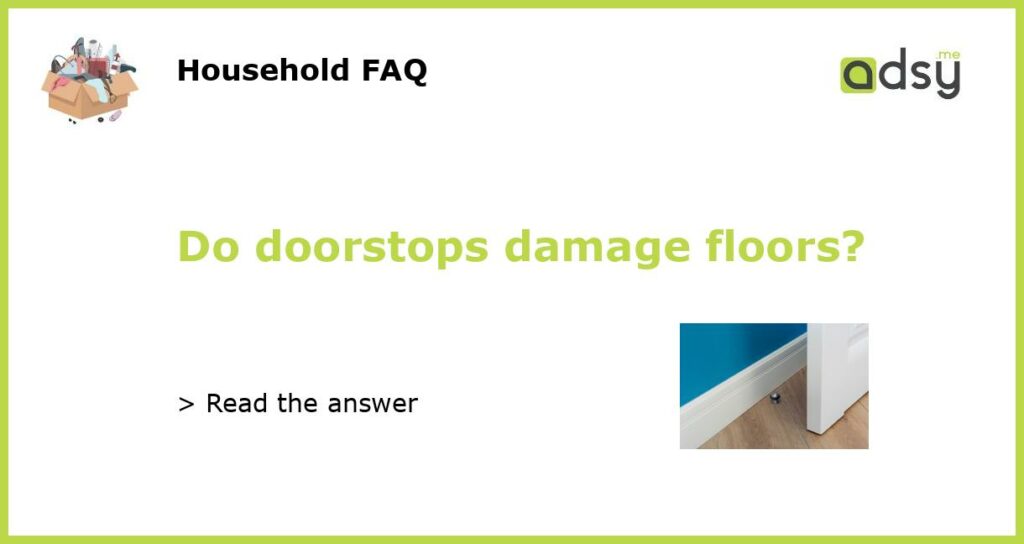Doorstops are a common household item that can be used to prevent doors from slamming shut or hitting a wall. While they serve a functional purpose, many people wonder if doorstops can potentially damage floors. In this article, we will explore the various types of doorstops, examine the potential risks they pose to different types of flooring, and provide recommendations on how to prevent any potential damage.
Types of Doorstops
There are several types of doorstops available in the market, each with its own design and functionality. The most common types include:
- Wedge doorstops: These are usually made of rubber or hard plastic and are placed at the bottom of the door to prevent it from closing.
- Doorstop bumpers: These are adhesive pads or disks that are stuck to the wall behind a door. They act as a cushion when the door is opened, preventing it from hitting the wall.
- Spring doorstops: These are installed on the baseboard or wall and have a spring-loaded mechanism that allows the door to be opened fully, but prevents it from being slammed shut.
- Magnetic doorstops: These are attached to the door itself and the floor or wall. They use magnetic force to hold the door open and prevent it from closing.
Risks to Different Flooring Types
While doorstops are generally designed to prevent damage, some types can potentially cause harm to certain types of flooring. Here are the risks associated with various flooring types:
- Hardwood floors: Wedge doorstops, if not properly secured or if made of a hard material, can scratch or dent hardwood floors when moved or accidentally kicked.
- Tile or ceramic floors: Heavy doorstop bumpers that are forcefully slammed into place can chip or crack tile or ceramic flooring.
- Laminate floors: Some doorstop materials, such as metal or hard plastic, can leave marks or scratches on laminate flooring when dragged or moved.
- Carpeted floors: Doorstop bumpers that are adhesive may leave residue on carpets, requiring additional cleaning or potentially damaging the carpet fibers if forcefully removed.
- Vinyl or linoleum floors: Poorly installed or misaligned doorstops with sharp edges can gouge or tear vinyl or linoleum flooring.
Preventing Damage
Fortunately, there are measures you can take to prevent any potential damage to your floors when using doorstops:
- Choose the right doorstop: Consider the type of flooring you have and select a doorstop that is appropriate for it. For example, opt for rubber or soft plastic wedge doorstops for hardwood floors.
- Secure the doorstop properly: Ensure that the doorstop is securely installed or placed to prevent any movement that could cause damage. Follow the manufacturer’s instructions for proper installation.
- Regularly inspect and maintain doorstops: Check for any signs of wear and tear or loose parts on your doorstops. Replace or repair any damaged doorstops promptly to prevent potential damage to your floors.
- Use protective mats or rugs: Consider placing a protective mat or rug near the doorway to further safeguard your floors. This can help absorb any impact from doorstops and prevent damage.
Alternative Options
If you are concerned about the potential risks doorstops pose to your floors, there are alternative options available:
- Door holders: Instead of using doorstops, consider installing door holders or doorstops that are mounted on hinges. These options allow you to hold the door open securely without the need for anything touching the floor.
- Furniture pads or bumpers: If you prefer to use doorstops, you can attach furniture pads or bumpers to the doorstops to provide an extra layer of protection. These pads can help cushion any impact and reduce the risk of floor damage.
- Door closer systems: For external doors, you can consider installing door closer systems. These systems automatically close the door gently, preventing any possibility of slamming and damage to the floor.
While doorstops can potentially cause damage to certain types of flooring, the risks can be minimized by selecting the right type of doorstop, securing them properly, and regularly maintaining them. Additionally, there are alternative options available to prevent any potential floor damage. By taking these precautions, you can comfortably use doorstops without worrying about damaging your floors.






